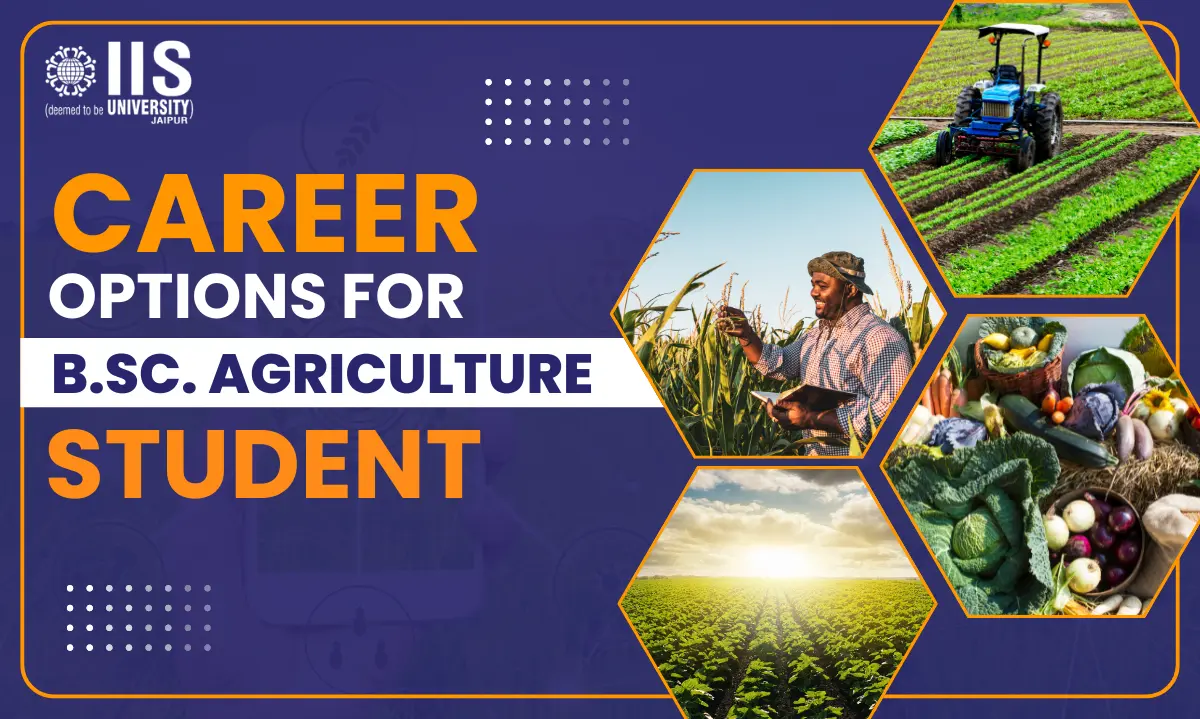Table of Contents
TogglePeople are increasingly understanding that long-term development cannot proceed without agriculture.
Particularly for women, a BSc in Agriculture might open several professional paths. It will enable them to change things and land a fulfilling employment.
Insights into the bright jobs and possible growth in this sector are provided in this blog about the broad BSc Agriculture scope for graduates.
All About BSc Agriculture Scopes
Beyond standard farming methods, the scope of BSc Agriculture is broad. The areas that it covers are science, study, and farming.
There is a greater need for people who work in healthy agriculture as the world moves toward it. Students who earn this degree will be ready to deal with issues like food stability and environmental protection.
Don't Know Which Career Option Is Best For YOU?
Get in Contact With our Expert Counsellors and Clear all Your Doubts.

A BSc in Agriculture is a good starting point for many other fields. These include earth science, gardening, plant breeding, and agronomy.
This method from different fields ensures that grads know a lot about the theory and practice of farming. A lot of the time, internships, research, and lab studies give students real-world experience. It helps students prepare for problems they might face in the real world.
Also, technological progress in agriculture is growing. The scope of BSc Agriculture has further expanded by precision farming, bioengineering, and ecological farming methods.
Graduates can use these tools to boost crop yields, improve the health of the soil, and support farming ways that are better for the climate. Because of this, a BSc in Agriculture is a flexible and long-lasting job choice.
Scope After BSc Agriculture
With a BSc in agriculture, you can go in many directions and make good money.
The following table lists some of the most important BSc Agriculture scope and salary in India:
| Scope | Salary (INR per annum) |
| Agricultural Officer | 3,00,000 – 5,00,000 |
| Agronomist | 4,00,000 – 6,00,000 |
| Farm Manager | 4,50,000 – 7,20,000 |
| Agricultural Scientist | 6,00,000 – 12,00,000 |
| Agricultural Consultant | 3,50,000 – 6,00,000 |
| Plant Breeder/Geneticist | 4,00,000 – 7,00,000 |
Here’s a detailed description of each BSc Agriculture scope:
1. Agricultural Officer:
Agricultural Officers assist banks and other financial companies in determining whether agricultural projects can succeed. By lending money and providing financial support, they assist farmers and agribusinesses.
You must be able to think critically and know a great deal about how farms operate for this position. You must visit farms, evaluate someone’s credibility as an Agricultural Officer, and ensure money is handled sensibly.
This vital job helps the farming industry and encourages growth in rural areas.
2. Agronomist:
An agronomist is a professional who studies and manages land and grows crops. They study new farming methods to increase food output and make the soil healthier.
Agronomists are very important for promoting safe farming methods. As part of their job, they look at soil samples and how crops grow and suggest the best ways to fertilize and eliminate pests.
Agronomists are crucial for making farms more productive and ensuring enough food for everyone.
3. Farm Manager:
Farm managers are in charge of running farms every day, which includes things like growing, harvesting, and handling workers.
They are responsible for ensuring the farm runs smoothly and makes money. For this job, you need to be able to lead and organize people well.
Also, farm managers need to know about the newest farming tools and trends. They help to introduce new ways of doing things on the farm.
They make budgets, decide how to use resources, and keep notes of farm operations as part of their job.
4. Agricultural Scientist:
Agricultural scientists study to develop new tools and ways to make farming more productive. They do their jobs in labs and out in the field.
They help make innovations that improve ecology and food security. Scientists who work in agriculture study things like plant breeding, pest control, and earth science.
Their study results are beneficial in making high-yield foods, plants that don’t get diseases, and farming methods that last for a long time.
5. Agricultural Consultant:
Agricultural Consultants help farmers and agribusinesses run their businesses better by giving them expert advice.
They look at data and devise ways to make things more efficient and profitable. For this job, you need both actual practice and theoretical understanding.
Agricultural consultants help people choose crops, care for their land, and develop business plans. They also help implement environmentally friendly practices and ensure rules are followed.
6. Plant Breeder/Geneticist:
Plant breeders and geneticists try to create new types of plants that are better able to handle pests, diseases, and harsh weather conditions.
They use genetic engineering and old-fashioned breeding methods to improve food quality and output. As part of their job, they cross-breed plants, do DNA studies, and look at the results.
Plant breeders and geneticists are significant for ensuring that farming will last and for ensuring enough food for everyone.
BSc Agriculture Scope
BSc Agriculture Scope For Female
The BSc Agriculture scope for female graduates is wide-ranging, and they can do well in many different areas.
Here is a table with some of the most well-known BSc Agriculture scope and salary in India:
| Scope | Salary (INR per annum) |
| Agricultural Educator | 3,00,000 – 5,00,000 |
| Soil Scientist | 4,00,000 – 6,00,000 |
| Food Scientist | 4,50,000 – 7,00,000 |
| Horticulturist | 3,50,000 – 6,00,000 |
| Agricultural Extension Officer | 3,00,000 – 8,60,000 |
Here’s a detailed description of each scope after BSc Agriculture for females:
1. Agricultural Educator:
Agricultural educators teach farmers and students about new ways to farm and how to farm in a way that doesn’t harm the environment.
In schools, colleges, and outreach programs, they do their jobs. They are essential for spreading information about farming.
Agricultural educators make lesson plans, run workshops, and teach students by doing.
They play a significant role in forming the next generation of farmers and pushing environmentally friendly methods.
2. Soil Scientist:
Soil scientists look at soil’s qualities and suggest how to handle and protect it. Their job is essential for keeping the soil healthy and ensuring that farming methods last.
Soil scientists study the soil, test the soil samples, and develop ways to make the soil more fertile. They work with farmers to use techniques that protect the land and increase food production.
3. Food Scientist:
Food scientists develop new foods and find ways to improve old ones. Working with food preparation companies, they ensure that food is safe and of good quality.
They help make food healthier and last longer. Food scientists study how to keep food fresh, package it, and process it.
They also develop new ways to deal with problems in food security and meet buyer needs for safe and healthy food items.
4. Horticulturist:
Professional horticulturists know how to grow foods, veggies, flowers, and plants for decoration. They do their jobs in research centers, botanical parks, and farms.
In turn, they help plant types become more diverse and better. Horticulturists study how to breed plants, get rid of pests, and care for the land.
They also plan and take care of lawns and other grounds. They help make green areas look better and be better for the earth.
5. Agricultural Extension Officer:
The job of an Agricultural Extension Officer is to connect farmers with research organizations.
They tell people about the research results and teach farmers about new tools and ways of doing things. They help to make farming more productive.
Agricultural Extension Officers set up workshops, show people how to do things in the field and meet with people one-on-one.
Their work is vital for spreading current farming methods and improving farmers’ lives.
Conclusion
IIS University stands out as a top university for those pursuing a career after BSc Agriculture. They provide in-depth education and training in this area.
They focus on research and new ideas and have state-of-the-art equipment and experienced teachers. IIS University is an excellent place for people who want to work as agriculture workers.
The university has strong ties to the business world and helps students find jobs. It makes sure that graduates are ready to go to work and make significant impacts on the agricultural industry.
The BSc in Agriculture study at IIS University (Best Girls University in India) covers all areas of modern agriculture, from growing crops to running a company.
Thanks to the program, students will receive the most up-to-date information and skills. It helps them get ready for an excellent job in agriculture.
There are also many jobs, field trips, and other hands-on learning experiences at the university.
FAQs: BSc Agriculture Scope and Salary in India
Q1. Is BSc Agriculture a good career option?
Getting a BSc in agriculture is a good idea because safe farming methods and food security are becoming increasingly critical.
For a career after BSc Agriculture, graduates have a variety of options. They can deal with the problems in modern farming and help the industry grow.
Q2. Can I get placement after BSc Agriculture?
Yes, many colleges, including IIS University, help their graduates find jobs after finishing a BSc in agriculture.
The employment group at IIS University helps students make resumes, prepare for interviews, and find jobs.
Q3. What is the highest paid job in BSc Agriculture?
Usually, an Agricultural Scientist makes between INR 6,00,000 and 12,00,000 a year, which is the most well-paid job in BSc Agriculture.
It depends on how much experience and knowledge you have. Agricultural Scientists are precious to businesses, government bodies, and research schools.

“The IIS University Team is a group of expert teachers and staff who are passionate about helping students learn and grow. They come from different fields but all aim to help guide the university’s students. They write these blogs to share their thoughts and ideas about learning and the importance of education. Their goal is to help students prepare for the future in a simple and understandable way.”
